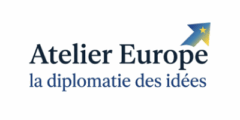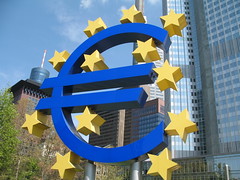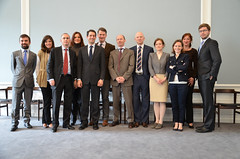La déclaration du président de la Banque centrale européenne (BCE), Mario Draghi, ce jeudi, suivant laquelle "la BCE est prête à faire tout ce qu'il faudra pour préserver l'euro" a eu comme effet d'apporter une accalmie sur les marchés, observable notamment via une détente sur les taux souverains espagnols et italiens. En affirmant que les niveaux de rémunération exigés par les investisseurs pour prêter à ces pays n'étaient pas acceptables, et donc en sous-entendant que la BCE pourrait agir pour les faire baisser, ce qu'elle peut faire (par exemple en rachetant des titres sur le marché secondaire, avec un effet immédiat sur le marché primaire de la dette, bien que la BCE ne puisse agir directement sur ce marché), la BCE s'est une fois de plus positionnée comme l'institution européenne la plus proactive et finalement la principale force motrice de l'intégration comme pouvait l'être la Cour de justice au début de la Communauté.
Qu'en conclure? Selon toute évidence que les institutions et les gouvernements européens disposent de marges de manœuvre réelles pour influencer les marchés. En d'autres termes, tout n'a pas été essayé pour lutter contre la crise financière et ses effets sur les dettes souveraines. Cette dimension a été abondamment commentée par la presse et il ne semble pas nécessaire d'y revenir. Une deuxième conclusion qui s'impose néanmoins, et qui est étrangement passée sous silence depuis le début de la crise, a trait à la signification d'une telle capacité à influencer les marchés, sans commmune mesure avec les sommets à répétition et dont les conclusions n'apportent qu'un optimisme éphémère, de quelques heures tout au plus. En effet, quand la BCE parle, les marchés écoutent, car la BCE décide, de manière indépendante et cohérente, et met en oeuvre ses décisions, tandis que l'on a vu à quel point les conclusions des sommets européens, ambitieuses prima facie, mais tellement floues et difficiles à mettre en oeuvre qu'elles ne trompent guère.
Pourquoi cela est-il possible? Parce que la BCE est la seule institution réellement fédérale de l'UE (la Commission dispose également de certaines compétences de nature fédérale: concurrence, commerce, etc., mais n'est pas une institution fédérale en tant que telle). Les sommets illustrent en revanche le retour en force de la méthode intergouvernementale, avec son cortège de complexité liée à la recherche laborieuse du consensus (mou), à la constitution d'équilibres précaires, aux combats de coqs entre chefs d'Etats, etc. Efficacité et crédibilité du fédéral d'une part, atermoiements de l'intergouvernemental d'autre part: la conclusion semble limpide. Reste à l'énoncer clairement et à en tirer les conséquences qui s'imposent.


